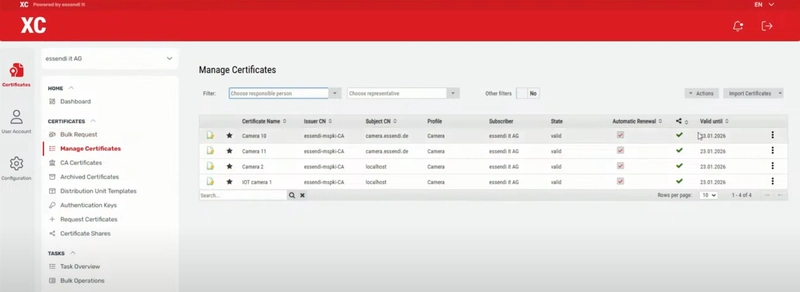When cert-manager meets Essendi XC
After a year of running in production, I'm ready to publish the first public release of the cert-manager issuer for the Essendi XC certificate management tool. Essendi XC Essendi XC is a platform focused on managing the lifecycle of digital certificates within organizations. It centralizes tasks like issuing, renewing, and revoking certificates, supporting integration with various certificate authorities and existing IT systems. The platform is designed to reduce manual work and help prevent certificate-related outages by automating routine processes. Its interface and APIs allow for easy monitoring and reporting of certificate status. Essendi XC is commonly used in environments where certificate sprawl and compliance are concerns. cert-manager The cert-manager operator is an extension for Kubernetes that automates the handling of certificates inside clusters, becoming the de-facto standard in this area. It enables users to define certificate requests as Kubernetes resources, which are then automatically fulfilled and renewed. By connecting cert-manager to external systems like Essendi XC, organizations can use their existing certificate infrastructure within Kubernetes. This integration helps ensure applications always have valid certificates without manual intervention. The operator is widely adopted for managing TLS in cloud-native deployments with issuer like Let's Encrypt or AWS Private CA. Why integrate cert-manager with Essendi XC in enterprise Kubernetes environments? As we know, cert-manager is the go-to standard for automating the management of TLS certificates within clusters. It natively handles certificate requests, renewals, and deployments, supporting integrations with both public CAs (via ACME) and enterprise CAs like Microsoft ADCS. However, as the number of clusters and applications grows, direct integration between each cluster and multiple CAs becomes hard to govern. This approach can lead to inconsistent policies, fragmented audit trails, and increased operational complexity-especially when compliance, security, and centralised visibility are required. For organizations with strict governance and compliance needs, it’s better to introduce a single certificate management layer that acts as the policy and automation hub for all certificate operations. Essendi XC fits this role by providing a central platform for certificate lifecycle management. The integration works as follows: when a Kubernetes workload needs a certificate, a developer or operator creates a Certificate resource in the cluster. The cert-manager issuer plugin for Essendi XC intercepts the CertificateRequest and forwards the CSR (Certificate Signing Request) to Essendi XC, specifying the correct certificate profile. Essendi XC then applies organizational policies, routes the request to the appropriate CA, handles any required validations or approvals, and finally returns the signed certificate. Cert-manager receives the certificate and stores it as a Kubernetes Secret, making it available to workloads without manual intervention. Installing, configuring and using the operator In a cluster that is already running an updated cert-manager instance you can add the additional issuer operator with: helm install essendi-xc-issuer --namespace cert-manager oci://registry-1.docker.io/angeloxx/cert-manager-essendi-xc-issuer --version 0.1.0-helm Once installed, you have to define a valid Essendi XC issuer with the ClusterIssuer CRD and the Secret with the needed API credential: apiVersion: v1 kind: Secret metadata: name: essendixc-cert-manager-test namespace: cert-manager stringData: client-id: Cert-Manager-90d client-secret: my-secret signature-key: signature token: eyJhbGciOiJIUzI1NiIsInR5cCIgOi[...] --- apiVersion: essendixc.angeloxx.ch/v1alpha1 kind: ClusterIssuer metadata: name: essendixc-ad-90d spec: authSecretName: essendixc-cert-manager-test customFields: - name: Application value: '{{ .Csr.CommonName }}' - name: DeploymentTarget value: Kubernetes - name: Environment value: Testing Environment - name: NotificationMail value: cloudnatives@bigcorp.ch ignoreHostInApiResponse: true profileName: AD-90days-Kubernetes subscriberName: DevopsTeam url: https://essendixc.bigcorp.local All of these settings are derived from the Essendi XC configuration. You create a profile and a subscriber, and during the request process, the CSR is submitted along with the specified additional customFields metadata. Essendi XC APIs does not offer an option to define the certificate duration directly; instead, the duration is determined by the profile referenced by the ClusterIssuer. The profile also defines whether certificate requests can be auto-approved and enforces certain constraints. For example, SANs must match a specific regular expression (such as .*.preproduction.bigcorp.local), or a minimum key length may be requi

After a year of running in production, I'm ready to publish the first public release of the cert-manager issuer for the Essendi XC certificate management tool.
Essendi XC
Essendi XC is a platform focused on managing the lifecycle of digital certificates within organizations. It centralizes tasks like issuing, renewing, and revoking certificates, supporting integration with various certificate authorities and existing IT systems. The platform is designed to reduce manual work and help prevent certificate-related outages by automating routine processes. Its interface and APIs allow for easy monitoring and reporting of certificate status. Essendi XC is commonly used in environments where certificate sprawl and compliance are concerns.
cert-manager
The cert-manager operator is an extension for Kubernetes that automates the handling of certificates inside clusters, becoming the de-facto standard in this area. It enables users to define certificate requests as Kubernetes resources, which are then automatically fulfilled and renewed. By connecting cert-manager to external systems like Essendi XC, organizations can use their existing certificate infrastructure within Kubernetes. This integration helps ensure applications always have valid certificates without manual intervention. The operator is widely adopted for managing TLS in cloud-native deployments with issuer like Let's Encrypt or AWS Private CA.
Why integrate cert-manager with Essendi XC in enterprise Kubernetes environments?
As we know, cert-manager is the go-to standard for automating the management of TLS certificates within clusters. It natively handles certificate requests, renewals, and deployments, supporting integrations with both public CAs (via ACME) and enterprise CAs like Microsoft ADCS. However, as the number of clusters and applications grows, direct integration between each cluster and multiple CAs becomes hard to govern. This approach can lead to inconsistent policies, fragmented audit trails, and increased operational complexity-especially when compliance, security, and centralised visibility are required.
For organizations with strict governance and compliance needs, it’s better to introduce a single certificate management layer that acts as the policy and automation hub for all certificate operations. Essendi XC fits this role by providing a central platform for certificate lifecycle management.
The integration works as follows: when a Kubernetes workload needs a certificate, a developer or operator creates a Certificate resource in the cluster. The cert-manager issuer plugin for Essendi XC intercepts the CertificateRequest and forwards the CSR (Certificate Signing Request) to Essendi XC, specifying the correct certificate profile. Essendi XC then applies organizational policies, routes the request to the appropriate CA, handles any required validations or approvals, and finally returns the signed certificate. Cert-manager receives the certificate and stores it as a Kubernetes Secret, making it available to workloads without manual intervention.
Installing, configuring and using the operator
In a cluster that is already running an updated cert-manager instance you can add the additional issuer operator with:
helm install essendi-xc-issuer --namespace cert-manager
oci://registry-1.docker.io/angeloxx/cert-manager-essendi-xc-issuer
--version 0.1.0-helm
Once installed, you have to define a valid Essendi XC issuer with the ClusterIssuer CRD and the Secret with the needed API credential:
apiVersion: v1
kind: Secret
metadata:
name: essendixc-cert-manager-test
namespace: cert-manager
stringData:
client-id: Cert-Manager-90d
client-secret: my-secret
signature-key: signature
token: eyJhbGciOiJIUzI1NiIsInR5cCIgOi[...]
---
apiVersion: essendixc.angeloxx.ch/v1alpha1
kind: ClusterIssuer
metadata:
name: essendixc-ad-90d
spec:
authSecretName: essendixc-cert-manager-test
customFields:
- name: Application
value: '{{ .Csr.CommonName }}'
- name: DeploymentTarget
value: Kubernetes
- name: Environment
value: Testing Environment
- name: NotificationMail
value: cloudnatives@bigcorp.ch
ignoreHostInApiResponse: true
profileName: AD-90days-Kubernetes
subscriberName: DevopsTeam
url: https://essendixc.bigcorp.local
All of these settings are derived from the Essendi XC configuration. You create a profile and a subscriber, and during the request process, the CSR is submitted along with the specified additional customFields metadata.
Essendi XC APIs does not offer an option to define the certificate duration directly; instead, the duration is determined by the profile referenced by the ClusterIssuer. The profile also defines whether certificate requests can be auto-approved and enforces certain constraints. For example, SANs must match a specific regular expression (such as .*.preproduction.bigcorp.local), or a minimum key length may be required.
A new certificate request, with the defined ClusterIssuer (essendixc-ad-90d) can be generated:
apiVersion: cert-manager.io/v1
kind: Certificate
metadata:
name: prommetheus-server-tls
namespace: prometheus
spec:
commonName: prometheus.metrics.test.bigcorp.local
dnsNames:
- prometheus.metrics.test.bigcorp.local
- prometheus-test.bigcorp.local
issuerRef:
group: essendixc.angeloxx.ch
kind: ClusterIssuer
name: essendixc-ad-90d
privateKey:
rotationPolicy: Always
renewBefore: 720h
secretName: prometheus-server-tls
subject:
countries:
- CH
localities:
- Mendrisio
organizationalUnits:
- IT Services
organizations:
- BigCorp SA
provinces:
- Ticino
usages:
- digital signature
- key encipherment
Cert-manager will evaluate and approve it, then generate a certificate request, which the cert-manager-essendi-xc-issuer operator will send to Essendi XC. Once approved
Conditions:
Last Transition Time: 2025-05-09T19:42:43Z
Message: Certificate request has been approved by cert-manager.io
Reason: cert-manager.io
Status: True
Type: Approved
Last Transition Time: 2025-05-09T19:43:18Z
Message: Signed
Reason: Issued
Status: True
Type: Ready
Events:
Type Reason Age From Message
---- ------ ---- ---- -------
Normal CertificateRequestReconciler 9m22s essendi-xc-issuer Initialising Ready condition
Normal cert-manager.io 9m22s cert-manager-certificaterequests-approver Certificate request has been approved by cert-manager.io
Normal CertificateRequestReconciler 9m17s essendi-xc-issuer Certificate request submitted, status: https://essendixc.bigcorp.local/api/v2/tasks/requests/25efc35a-24de-4227
-95a2-7297d007a650
Normal CertificateRequestReconciler 9m14s essendi-xc-issuer Certificate request approved, resource: https://essendixc.bigcorp.local/api/v2/tasks/requests/25efc35a-24de-422
7-95a2-7297d007a650
Normal CertificateRequestReconciler 8m47s essendi-xc-issuer Certificate is signed, resource: https://essendixc.bigcorp.local/api/v2/certificates/ac7f77f7194d4473d4e1ba832d
6c0182e00f927453705b59068095e2fff8d72b
Normal CertificateRequestReconciler 8m47s essendi-xc-issuer Signed
the operator received the signed request and the application received the requested.
Some attributes, such as spec.privateKey.rotationPolicy = Always, may be mandatory. This is one of the aspects that differentiates the use of a centralised certificate manager from the direct integration of a CA. A company-wide policy might restrict the reuse of private keys. In Kubernetes, you can enforce this policy using Kyverno, but you cannot do the same outside a cluster.
Wrap up
In an enterprise environment, this operator acts as a bridge between a cloud-native platform like Kubernetes and the centralised certificate management solution, eliminating the need to connect cert-manager directly to multiple providers.
The project is available on GitHub:
https://github.com/angeloxx/cert-manager-essendi-xc-issuer
























![[Exclusive] Infinix GT DynaVue: a Prototype that could change everything!](https://www.gizchina.com/wp-content/uploads/images/2025/05/Screen-Shot-2025-05-10-at-16.07.40-PM-copy.png)















































![Apple M4 iMac Drops to New All-Time Low Price of $1059 [Deal]](https://www.iclarified.com/images/news/97281/97281/97281-640.jpg)
![Beats Studio Buds + On Sale for $99.95 [Lowest Price Ever]](https://www.iclarified.com/images/news/96983/96983/96983-640.jpg)

![New iPad 11 (A16) On Sale for Just $277.78! [Lowest Price Ever]](https://www.iclarified.com/images/news/97273/97273/97273-640.jpg)











![As Galaxy Watch prepares a major change, which smartwatch design to you prefer? [Poll]](https://i0.wp.com/9to5google.com/wp-content/uploads/sites/4/2024/07/Galaxy-Watch-Ultra-and-Apple-Watch-Ultra-1.jpg?resize=1200%2C628&quality=82&strip=all&ssl=1)















-xl.jpg)

















































































































































































































![[The AI Show Episode 146]: Rise of “AI-First” Companies, AI Job Disruption, GPT-4o Update Gets Rolled Back, How Big Consulting Firms Use AI, and Meta AI App](https://www.marketingaiinstitute.com/hubfs/ep%20146%20cover.png)
































































































































































![Ditching a Microsoft Job to Enter Startup Purgatory with Lonewolf Engineer Sam Crombie [Podcast #171]](https://cdn.hashnode.com/res/hashnode/image/upload/v1746753508177/0cd57f66-fdb0-4972-b285-1443a7db39fc.png?#)


![[FREE EBOOKS] Offensive Security Using Python, Learn Computer Forensics — 2nd edition & Four More Best Selling Titles](https://www.javacodegeeks.com/wp-content/uploads/2012/12/jcg-logo.jpg)


































































































